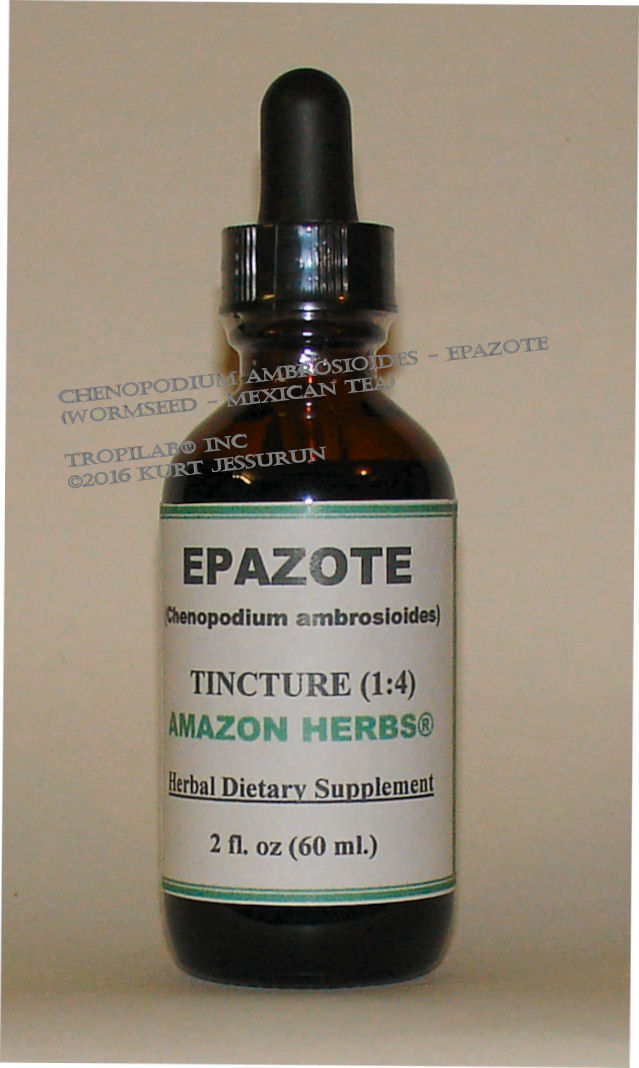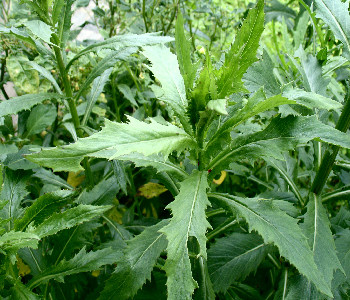Overview
 Epazote (Wormseed or Mexican tea) is used as a leaf vegetable and herb for its
pungent flavor. Raw, it has a resinous, medicinal pungency, similar to the liquorice taste of anise, fennel, or
even tarragon but only stronger.
Epazote (Wormseed or Mexican tea) is used as a leaf vegetable and herb for its
pungent flavor. Raw, it has a resinous, medicinal pungency, similar to the liquorice taste of anise, fennel, or
even tarragon but only stronger.
The entire plant is utilized for its medicinal applications. It is indigenous to Suriname and other South American countries.
Epazote is antibacterial, digestive, vermifuge, colic and works against stomach pains. Because of its
efficacy, ease of administration and low toxicity, it is the most valuable and successful of all the vermifuge remedies
(destroys or expels parasitic worms). The extract of the plant is a potential analgesic agent and has internal- and topical uses. A
decoction is used for various skin diseases such as eczema and ulcers.
Constituents
Anthraglycosides, cinnamic acid derivatives, mucins and pectins, saponins, amygdalin,
ascaridol, geraniol, cymene, monoterpenes and monoterpene derivatives (a-pinene, myrcene, terpinene, thymol,
camphor and trans-isocarveol, oxalic acid.
Pharmacology
 The essential oil of this plant and its main chemical, ascaridole (a monoterpene); showed strong
anti-tumor actions against numerous different cancerous tumor cells, uterine fibroids, cysts, and cystadenomas
(including several multi-drug resistant tumor cell lines) in ongoing research.
The essential oil of this plant and its main chemical, ascaridole (a monoterpene); showed strong
anti-tumor actions against numerous different cancerous tumor cells, uterine fibroids, cysts, and cystadenomas
(including several multi-drug resistant tumor cell lines) in ongoing research.
Leishmaniasis is a major tropical parasitic disease; the current therapy is toxic, expensive and may cause several adverse
effects.
To date, there are no vaccines against it and chemotherapy remains the mainstay for the control of this disease.
A study was done to examine the activity of the essential oil from Chenopodium ambrosioides in mice, infected
with Leishmania amazonensis. They received two cycle of treatment by different routes (intra-peritoneal, oral or
intra-lesional). Intraperitoneal and oral treatment at 30 mg/Kg with the essential oil had better anti-leishmanial
effect than a remedy with the reference drug, Amphotericin B (Fungizone), at 1 mg/Kg.
The toxicity and the resistance were examined after treatment. Signs of toxicity were evident only in the animals
treated by intraperitoneal route. This is an injection of a substance into the peritoneum (body cavity). No resistance
was detected in L. amazonensis isolates obtained from treated mice.
This natural product could be an alternative for the development of a new drug against cutaneous leishmaniasis
(causes skin sores).
Internal Uses
Amoebas, asthma, colic, cough, flatulence, worms and peptic ulcers.
Epazote (Chenopodium ambrosioides) main use is to natural expel intestinal worms from humans and animals.
The oil extracted from the plant (Chenopodium oil) is very effective against
Hookworm disease (ankylostomiasis), the common human tapeworm (Hymenolepsis nana) and the ascaris eggs.
Epazote leaf extract is 100% effective against the common intestinal parasites, Ancilostoma and Trichuris, and 50%
adequate against Ascaris.
Topical Uses
Athlete's foot (Tinea pedis), fever, hemorrhoids, insect repellent, ringworm, snakebites and
wounds
Dosage
Tincture: 1 - 3 ml. per day
Infusion (herbal tea): 1 - 2 cups per day
Use with caution and preferably under the supervision of a qualified practitioner.
Contraindications
Large doses may be toxic and can cause hearing loss, incontinence, vertigo, sweating.
Larger therapeutic doses should only be done with supervision by a competent health professional.
Avoid during pregnancy and lactation.
Reference
Grieve. A Modern Herbal. Penguin 1984 ISBN 0-14-046-440-9
Not so modern
(1930's?) but lots of information, mainly temperate plants.
Lust. J. The Herb Book. Bantam books 1983 ISBN 0-553-23827-2
Lots of information tightly crammed into
a fairly small book.
Uphof. J. C. Th. Dictionary of Economic Plants. Weinheim 1959
An excellent and very comprehensive guide
but it only gives very short descriptions of the uses without any details of how to utilize the plants. Not for
the casual reader. Cambridge University Press 1964
An immense work in 6 volumes (including the index). The
standard reference flora for europe, it is very terse though and with very little extra information. Not for the
casual reader.
Schery. R. W. Plants for Man.
Fairly readable but not very comprehensive. Deals with plants from around
the world. Usher. G. A Dictionary of Plants Used by Man. Constable 1974 ISBN 0094579202
Forget the sexist
title, this is one of the best books on the subject. Lists a very extensive range of useful plants from around
the world with very brief details of
Harrington. H. D. Edible Native Plants of the Rocky Mountains. University of New Mexico Press 1967
ISBN 0-8623-0343-9
A superb book. Very readable, it gives the results of the authors experiments with native
edible plants. Tanaka. T. Tanaka's Cyclopaedia of Edible Plants of the World. Keigaku Publishing 1976
The most comprehensive guide to edible plants I've come across. Only the briefest entry for each species, though,
and some of the entries are more than a little dubious. Not for the casual reader. Singh. Dr. G. and Kachroo.
Prof. Dr. P. Forest Flora of Srinagar. Bishen Singh Mahendra Pal Singh 1976
A good flora of the western
Himalayas but poorly illustrated. Some information on plant uses.
Activity, toxicity and analysis of resistance of essential oil from Chenopodiu, ambrosioides after intraperitoneal,
oral and intralesional administration in BALB/c mice infected with Leishmania amazonensis: a preliminary study.
Lianet Monzote, Ana M Montalvo, Ramón Scull, Migdalia Miranda, Juan Abreu
(Affiliation: Parasitology Department, Institute of Medicine Tropical "Pedro Kourí", Apartado Postal No. 601,
Marianao 13, Havana City, Cuba. monzote at ipk.sld.cu
Biomedicine & pharmacotherapy = Biomédecine & pharmacothérapie (Biomed Pharmacother) 2007 Feb-Apr Vol. 61
Issue 2-3 Pg. 148-53 ISSN: 0753-3322 France
The above presentation is for informational and educational purposes only.
It is based on scientific studies (human, animal, or in vitro), clinical experience, or traditional usage.
For many of the conditions discussed, treatment with prescribed (RX) or over - the - counter (OTC) medication is also
available.
Consult your doctor, practitioner, and/or pharmacist for any health problem and before using
dietary supplements or before making any changes in prescribed medications.
|

